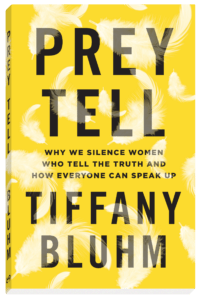There he was, 10 feet in front of me in broad daylight. There was no mistaking him for someone else. To my advantage, I spotted him from behind the tinted windows of my car, where he couldn’t see me, yet I could watch him. Of course, I knew the day would come when our paths would cross, but I never guessed it would happen without him ever knowing.
Truth be told, up to that point I feared his presence so severely that I avoided his local haunts and had been successful in maintaining my distance. Yet there he was. With a pounding heart and shaking hands, I held my breath and clenched the steering wheel as he crossed the street in front of me.
As he passed, one step in front of the other, the most remarkable thing happened — I survived. Time froze so I could be afforded a moment to realize that his hold over me was gone. Before he vanished from sight, I whispered, “I won’t give you power over me. Not anymore.”

Tiffany Bluhm
I found it terribly odd that, the very same day I saw that man walking down the street when I sat crouched in my car, I had read a lengthy piece about a publicly beloved man’s untoward actions behind closed doors. Women who had previously worked for the well-known icon disclosed stories that painted him in an unfavorable light in the country’s most distinguished newspaper. Their stories reminded me that my own story was not to be despised but rather to be honored for how it had given me a deep commitment to justice, truth telling and accountability.
Yet for me, the penny was still in the air. That man on the street, by the looks of it, was going to get away with all he had done with zero ramifications or consequences. It seemed as though he had won — and I had lost more than I would have ever dreamed. He held the power; I did not.
You see, for the majority of my life I had made it my mission to keep men who held power in my life pleased with me, to stay on their good side, and to do as I was told. I played by their rules and hardly questioned their authority. Every boss I’ve ever had, except for one (thank you to the beautiful Korean woman who managed the Quiksilver outlet), has been a well-resourced white man. Every pastor I’ve ever had, including my grandfather, has been a white man.
“I mastered silencing my own voice in order to be of value to the world around me, especially to the men who employed or pastored me.”
On top of that, in nearly every setting I grew up in, I was the only minority, the token brown girl in a sea of snow white. My nickname in high school, printed on the back of my cheer sweatshirt and cat-called through the halls, I kid you not, was “brown girl.” As an agreeable, conflict-avoidant woman of color, rather than voice any concern when I spotted discrepancies or experienced othering, I mastered silencing my own voice in order to be of value to the world around me, especially to the men who employed or pastored me.
This is what postcolonial theorist and Columbia University professor Gayatri Spivak describes when minorities, in an effort to have power, contort themselves to manifest it in a way that is recognizable and acceptable to those who ultimately hold it. I could fit your definition of acceptable to ensure you felt comfortable with my presence.
As an adopted girl from East India raised in a rural white community with white parents and male siblings, I never thought to question the hierarchy, as I was conditioned to believe that the world was ordered for men of means to hold power and for people like me, those who didn’t fit the order, to fall in line and take whatever scraps were given to us.
This implicit belief was reinforced in textbooks, in movies, by the government, at hourly wage jobs, from the pulpit, and even on notoriously racist billboards along the highway. Women were second to men, and minority women sat at the end of the line. Men set the rules, defined their meaning and enforced said rules.
Growing up, I wish I’d known of the strides women had made worldwide to be recognized as equals, to be seen as dignified and worthy of respect — how women marched, lobbied and fought against patriarchal practices in the halls of power that demeaned, silenced and slandered them. I wonder if I would have gleaned from their strength and stories, believing that another way was possible: one where women, even marginalized, minority women, have a place that is not inferior but necessary.
“Growing up, I wish I’d known of the strides women had made worldwide to be recognized as equals.”
Even if I did learn of Toni Morrison, bell hooks, Savitribai Phule, the Grimké sisters, or Sojourner Truth, it was hard to believe that equality was possible when one of my earliest, most terrifying memories was playing in the yard of the neighbor girl’s house when her dad, with a shotgun in tow, screamed at me to get off of his lawn and “go back to where you came from.”
I heard him loud and clear and ran as quickly as my little legs could carry me through their field, across the street, and up my driveway, straight into my house, where I hid in my room. I was 7. The very next day at school, my friend said nothing of the encounter between her dad and me. She never spoke of it, and neither did I.
I, as a young brown girl, was inferior, and that white man, 40 years my senior, with his shiny black gun, was superior. I would not be convinced otherwise.
After I graduated from high school, my understanding of a woman’s place in the world expanded as my grip on justice tightened, but I still held to this conscious, and subconscious, belief that if I held even a shred of power, it was because someone with privilege (in my case, white male privilege) had given it to me.
Many of my pastors, bosses, teachers and mentors, to their credit, were outrageously gracious, kind and generous. To them I owe so much. They believed in women, married strong women and gave me opportunities I never would have had otherwise; however, they still remained in charge of women. Many of them treated that power with the utmost respect; others abused it beyond what I could have ever imagined.
Like many other women, I’ve made excuses for the men in my world. He didn’t mean it like that. That wasn’t his intent. He’s a good guy. I’m sure he has my best interest at heart. He is the one God chose to lead me. He sees the whole picture. He knows change takes time. He means well, but boys will be boys.
I made excuses until I couldn’t. Until my convictions outweighed my loyalty.
 Tiffany Bluhm is the author of the new book Prey Tell and the books She Dreams and Never Alone and their companion Bible studies. She is cohost of the podcast “Why Tho,” a show answering the existential and nonsensical questions we ask ourselves, and speaks at conferences and events around the world. As a minority, immigrant woman with an interracial family, Bluhm is passionate about inviting all to the table of faith, equality, justice and dignity. She lives in the Pacific Northwest.This column is excerpted from Prey Tell, ©2021, and used by permission of Baker Publishing.
Tiffany Bluhm is the author of the new book Prey Tell and the books She Dreams and Never Alone and their companion Bible studies. She is cohost of the podcast “Why Tho,” a show answering the existential and nonsensical questions we ask ourselves, and speaks at conferences and events around the world. As a minority, immigrant woman with an interracial family, Bluhm is passionate about inviting all to the table of faith, equality, justice and dignity. She lives in the Pacific Northwest.This column is excerpted from Prey Tell, ©2021, and used by permission of Baker Publishing.


